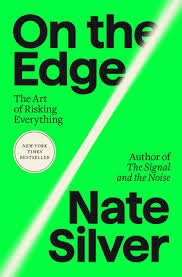Edgy
Nate Silver's new book on risk traces jagged lines
I backed into Nate Silver. Nine years ago, I picked up his book The Signal and the Noise at the urging of my son, who had just graduated with a degree in economics from the University of Chicago and loved Silver’s quantitative approach to the art of prediction. I found the book a stretch to follow, but a welcome one. A few years later I became a fan of Silver’s 538 politics podcasts when I changed jobs and began listening as part of my daily commute. As his followers know, politics has never really been Silver’s primary love—he began his career as a sports (specifically baseball) pundit, and in recent years has focused on poker. There’s freshness—perhaps an ornery brashness—to his perspective that I’ve found compelling, and I anticipated his new book with some interest, catching a glimpse of its eye-catching lime-green cover when an advance copy arrived in a bookstore I was visiting while on vacation last summer. So I was an early adopter of On the Edge: The Art of Risking Everything.
Perhaps because Silver’s talents are at the rim, and often cross beyond, my skillset, I found On the Edge slow going. The core of his argument is arresting and persuasive: Silver argues that the nation’s elite is divided between two sorts of people. The first is those he called residents of “The River,” which he characterizes as “an ecosystem of people and ideas” who “speak one language with terms such as expected value, Nash equilibrium, and Bayesian priors.” The River is ruthlessly empirical, quantitative, and comfortable taking large risks in the hope of huge payoffs. This is the world of Peter Thiel, Elon Musk, and Sam Altman. The contrasting world is that which Silver calls “The Village”: “people who work in government, in much of the media, and in parts of academia (although perhaps excluding some of the more quantitative academic fields such as economics). It has distinctly left-of-center politics associated with the Democratic Party.” Silver argues that while the Village has tended to dominate the nation’s cultural discourse, the River is in the ascendant. He’s a bit ambivalent about that—he spends much time in On the Edge exploring the problematic aspects of the River perspective—but he does so as a self-identified member and one restless with the sometimes smug complacency of a Village that puts ideology before practicality, efficiency, and fairness (a term defined with libertarian accents).
My problem with the book was less a matter of conception than execution. On the Edge sprawls. Lots of footnotes (by that I don’t mean citations, which are usefully plentiful, but digressions at the bottom of the page) and sidebars. Some subjects, like the rise and fall of convicted cryptocurrency entrepreneur Sam Bankman-Fried, who Silver interviewed multiple times for the book, are lively, but could have benefited from a more systematic approach to explaining where SBF came from and what he did before explaining why he was a failure on River terms at least as much as Village ones. I felt similarly about his handling of Artificial Intelligence, a subject in which a reader is more immersed than edified.
But maybe that’s the price of the ticket here. Silver sometimes cautions and even encourages readers that they may want to skip around in his discourse. I appreciate the self-awareness this shows, though I did find myself wishing for more craft and cohesion amid what is undeniably a fluid and lively writing voice. Maybe this is just another way of saying I’m not River guy—which I guess makes me, however fitfully, a Village resident. It’s helpful to have a map, even if it is a little hard to follow.

